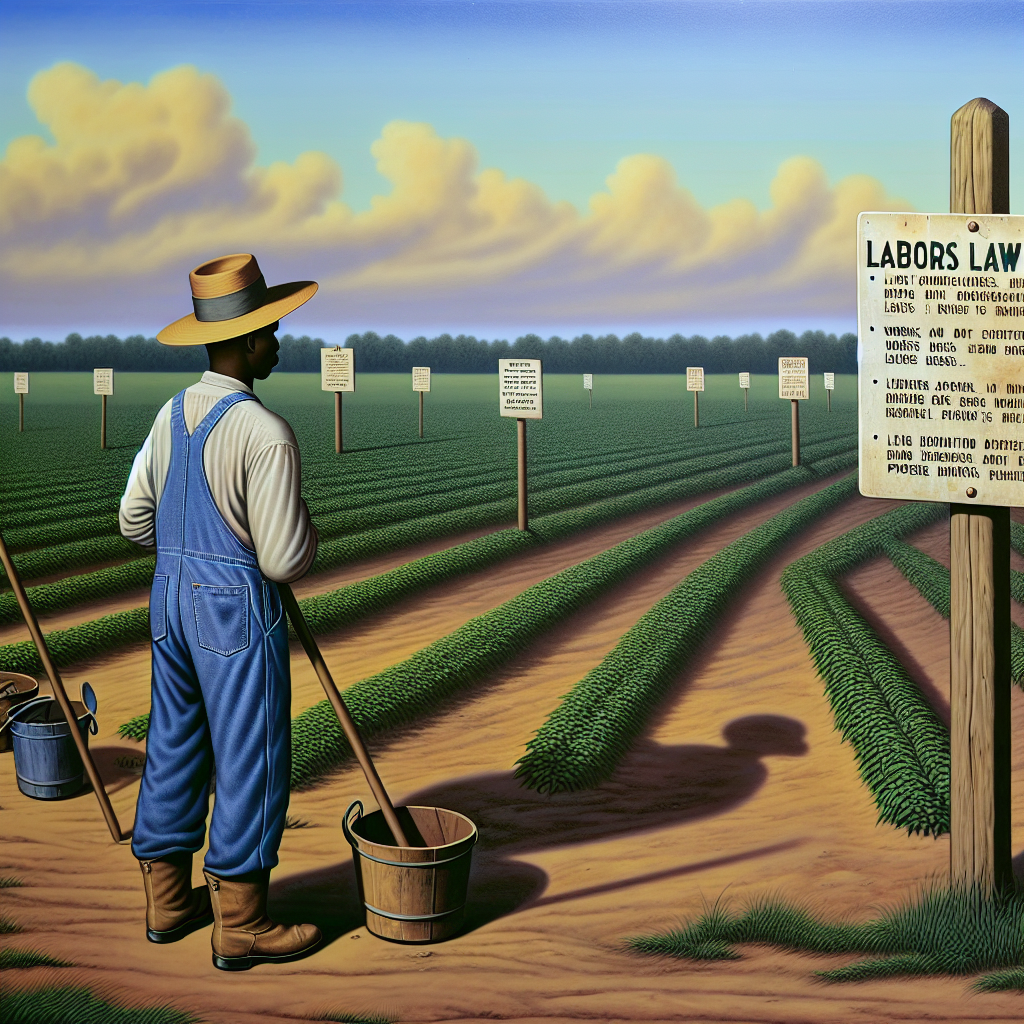Understanding Federal vs. State Labor Laws in Agriculture
Overview of Federal Labor Laws
Federal labor laws provide a baseline for worker protections.
The Fair Labor Standards Act sets rules for minimum wage and overtime.
Additionally, federal laws regulate child labor in agriculture.
Compliance with these laws is essential for all agricultural employers.
Exploring State Labor Laws
State laws can offer additional protections beyond federal standards.
Some states require higher minimum wages than the federal level.
Moreover, child labor laws may differ from federal guidelines.
Employers must be aware of specific state labor statutes.
Differences Between Federal and State Regulations
Federal laws serve as the minimum requirement for labor standards.
State laws can vary greatly in their approach to worker protection.
Employers should regularly review both federal and state laws.
This ensures full compliance and minimizes legal risks.
Importance of Compliance in Agriculture
Compliance protects the rights of workers and promotes fairness.
Understanding labor laws can improve the workplace environment.
Additionally, compliance prevents costly fines and legal disputes.
Transform Your Agribusiness
Unlock your farm's potential with expert advice tailored to your needs. Get actionable steps that drive real results.
Get StartedFarm owners and operators must prioritize understanding these laws.
Key Labor Law Regulations Every Farmer Should Know
Understanding the Fair Labor Standards Act
The Fair Labor Standards Act (FLSA) sets important guidelines for farm labor.
This law governs minimum wage and overtime pay for workers.
Farmers must adhere to the wage rates set by the FLSA.
For instance, workers may earn a minimum wage of $7.25 per hour.
Overtime pay generally applies to hours worked beyond 40 per week.
This means farmers should track employees’ hours carefully.
Child Labor Regulations
Child labor laws are crucial for farm safety and health.
These laws restrict the age and hours that minors can work.
Generally, workers under 16 face limitations on work hours during school weeks.
Farmers should ensure that minor employees are not exposed to hazardous jobs.
For example, operating heavy machinery is prohibited for underage workers.
Health and Safety Standards
Ensuring worker safety is paramount in agricultural work.
The Occupational Safety and Health Administration (OSHA) sets the safety standards.
Farmers must provide a safe working environment for all employees.
This includes providing proper training and safety equipment.
Farmers should also conduct regular safety audits on equipment and facilities.
Recordkeeping Requirements
Farmers must maintain accurate records of employee hours and wages.
This recordkeeping ensures compliance with labor laws.
Relevant documents include payroll records and time cards.
Keeping these records for at least three years is advisable.
Moreover, accurate records can protect farmers during audits.
Compliance with Immigration Laws
Employing migrant workers requires adherence to immigration laws.
Farmers should verify the eligibility of their workers to work legally in the country.
Showcase Your Farming Business
Publish your professional farming services profile on our blog for a one-time fee of $200 and reach a dedicated audience of farmers and agribusiness owners.
Publish Your ProfileThis process includes completing Form I-9 for each employee.
Failure to comply with these laws can lead to heavy fines.
Hence, maintaining proper documentation is essential.
The Importance of Maintaining Accurate Employee Records
Enhanced Compliance
Maintaining accurate employee records ensures compliance with labor laws.
This practice helps avoid costly fines and penalties.
Compliance also improves your farm’s reputation and operational efficiency.
Better Decision-Making
Accurate records support informed decision-making for staffing and resource allocation.
They provide insights into employee performance and productivity.
Furthermore, they help identify trends and areas for improvement.
Streamlined Operations
Maintaining organized employee records streamlines various farm operations.
It simplifies payroll processing and performance evaluations.
Additionally, easy access to records allows for better communication among teams.
Liability Protection
Having accurate records offers protection against potential lawsuits.
Documentation proves compliance with labor regulations and employee agreements.
Consequently, you can mitigate risks associated with employee disputes.
Strategic Workforce Planning
Accurate employee records enable strategic workforce planning.
They help identify skill gaps and training needs within your team.
Moreover, this information aids in recruitment and retention efforts.
Learn More: The Role of Trade Agreements in Farming Success
Strategies for Properly Classifying Workers on the Farm
Understand Worker Classifications
Differentiate between employees and independent contractors.
Know that employees are typically under your control.
Furthermore, independent contractors operate with more autonomy.
Misclassification can lead to legal repercussions.
Review Labor Laws
Familiarize yourself with federal and state labor laws.
Each state may have specific classifications for farm workers.
Stay updated on changes to ensure compliance.
Conduct Regular Audits
Perform audits to review your worker classifications regularly.
This practice can help identify potential misclassifications.
By doing so, you can correct any issues before they escalate.
Document Worker Roles
Keep detailed records of each worker’s responsibilities.
This helps clarify their classification status.
Moreover, accurate documentation protects your farm in case of disputes.
Consult Legal Experts
Engage with legal professionals when in doubt.
They can provide clarity on complex labor laws.
In addition, their guidance can help navigate potential pitfalls.
Gain More Insights: Overview of Agricultural Export Laws
Ensuring Health and Safety Standards in Agricultural Work
Understanding Health and Safety Regulations
Health and safety regulations safeguard farm workers’ well-being.
Farms must comply with local, state, and federal regulations.
These laws cover various aspects, including handling hazardous materials.
Employers should regularly consult updated compliance documents.
Showcase Your Farming Business
Publish your professional farming services profile on our blog for a one-time fee of $200 and reach a dedicated audience of farmers and agribusiness owners.
Publish Your ProfileEstablishing Safe Work Environments
Creating a safe work environment starts with proper training.
All workers must receive training on safety procedures.
Additionally, provide personal protective equipment to all employees.
Ensure that safety gear fits properly and is in good condition.
Identifying Hazardous Conditions
Regularly inspect the workplace for possible hazards.
Common hazards include slips, falls, and machinery accidents.
Establish a reporting system for workers to notify management.
Encourage open communication about safety concerns.
Implementing Emergency Protocols
Every farm should have a clear emergency response plan.
Train workers on emergency procedures and evacuation routes.
Conduct regular drills to ensure everyone knows their role.
Keep emergency numbers visible and accessible throughout the farm.
Monitoring and Reviewing Safety Practices
Regularly review safety practices to ensure compliance.
Establish a safety committee to address ongoing concerns.
Solicit employee feedback to improve safety measures.
Document all safety training sessions and incidents thoroughly.
Uncover the Details: Benefits of Trade Policies for Farmers

How to Implement Fair Labor Practices in Hiring
Understand Legal Requirements
Familiarize yourself with federal and state labor laws.
These laws govern minimum wage, overtime, and working hours.
Additionally, ensure compliance with health and safety regulations.
Establish Clear Job Descriptions
Clearly outline job responsibilities and expectations.
This helps attract suitable candidates for the roles.
Include necessary skills and qualifications in your listings.
Conduct Fair Hiring Practices
Implement standardized interview processes for all candidates.
This approach minimizes bias during candidate evaluation.
Use diverse hiring panels to promote inclusion and fairness.
Provide Equal Opportunities
Affirm your commitment to equal employment opportunities.
Encourage applicants from diverse backgrounds to apply.
Ensure hiring practices reflect diversity and inclusion goals.
Ensure Transparency in Pay Practices
Clearly communicate pay structures to all employees.
Transparency fosters trust and accountability within your organization.
Additionally, avoid wage disparities based on gender or ethnicity.
Educate Your Team on Labor Laws
Provide training sessions about labor laws for hiring managers.
This ensures they understand compliance and fair practices.
Regular updates will keep your team informed about legal changes.
Regularly Review Hiring Policies
Evaluate your hiring practices periodically for effectiveness.
Seek feedback from employees to improve processes.
Adjust policies to address any identified gaps or issues.
Create a Reporting System
Encourage employees to report any labor law violations.
Develop a safe and anonymous system for reporting concerns.
Showcase Your Farming Business
Publish your professional farming services profile on our blog for a one-time fee of $200 and reach a dedicated audience of farmers and agribusiness owners.
Publish Your ProfileThis promotes a culture of accountability and compliance.
Find Out More: Essential Documentation For Organic Certification
Navigating Seasonal Labor Challenges and Compliance
Understanding Seasonal Labor Needs
Farmers must assess their seasonal labor requirements early.
Different crops have varying peak labor times.
Additionally, unforeseen weather events can affect labor needs.
Planning ahead helps mitigate labor shortages.
Compliance with Labor Laws
Understanding labor laws is essential for compliance.
Farmers should familiarize themselves with federal and state regulations.
Specific rules apply to wage rates and working conditions.
Regular training sessions can keep everyone informed.
Record Keeping Practices
Maintaining accurate records is crucial for compliance.
Document hours worked and wages paid to each worker.
Implementing digital record-keeping can simplify this process.
Regular audits of your records can catch potential issues early.
Engaging Legal and HR Expertise
Consulting with legal experts ensures adherence to labor laws.
Human resources specialists can streamline your hiring process.
They can also provide valuable training on compliance issues.
Building a solid support system fosters compliance and reduces risk.
Training and Orientation for Workers
Proper training increases productivity and safety on the farm.
New workers should receive clear instructions on their roles.
Regular refresher sessions can improve compliance awareness.
Creating a culture of safety encourages worker responsibility.
Mitigating Risks of Non-Compliance
Non-compliance leads to legal penalties and financial losses.
Farmers should regularly review labor practices for compliance viability.
Keeping abreast of changes in labor laws is vital for avoidance.
Engaging with industry groups can provide necessary updates.
Resources for Staying Updated on Changes in Labor Laws
Official Government Websites
Government websites provide reliable and up-to-date information.
Visit the U.S. Department of Labor’s site regularly for current updates.
State labor departments also offer tailored resources for local changes.
Industry Associations
Many industry associations track labor law changes closely.
Organizations like the National Farmers Union provide useful insights.
Joining these associations can offer additional resources and support.
Online Newsletters and Alerts
Subscribing to legal newsletters keeps you informed on upcoming changes.
Many law firms also offer updates on labor law via email alerts.
Use this information to stay ahead in understanding compliance challenges.
Conferences and Workshops
Attending conferences can enhance your understanding of labor laws.
Workshops often provide hands-on training and expert advice.
Networking with peers also shares valuable compliance strategies.
Social Media and Online Forums
Follow labor law experts and organizations on social media platforms.
Engaging in forums allows for discussion on compliance issues.
Showcase Your Farming Business
Publish your professional farming services profile on our blog for a one-time fee of $200 and reach a dedicated audience of farmers and agribusiness owners.
Publish Your ProfileThis resource can provide real-time insights and experiences from others.
Additional Resources
Animal Welfare Act | National Agricultural Library
Migrant and Seasonal Agricultural Worker Protection Act (MSPA …




